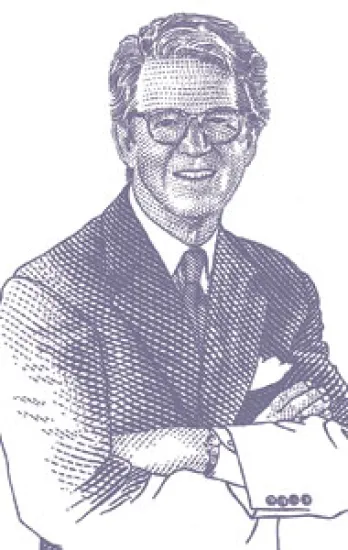Running a bank in the midst of arguably the worst credit crisis since the Great Depression is no picnic. Just ask Vikram Pandit or Kenneth Lewis. Most big U.S. banks have seen their earnings plummet over the past 18 months — and that’s if they’re lucky. Pandit’s Citigroup and Lewis’s Bank of America Corp. are fighting hard to stay in public ownership and avert an effective nationalization of their institutions.
But for Ronald Hermance Jr., CEO of Hudson City Bancorp, the crisis serves to underscore a job well done. The Paramus, New Jersey, lender avoided the excesses of the housing boom earlier this decade. It never got into the subprime game but instead stuck to its expertise of making jumbo mortgage loans in the suburbs west of New York City, requiring a minimum 20 percent downpayment and keeping the loans on its books rather than slicing and dicing them for investors. This conservative strategy, until recently seen as stodgy and behind the times, is now paying off big. The bank’s earnings jumped 50.6 percent in 2008, to $446 million, marking the tenth consecutive year of record earnings. Hudson City’s share price gained 9.0 percent in 2008.
"We’re simply a single-family lender," Hermance tells Institutional Investor . "We’ve never left that business. We’re very narrow and deep."
Investors certainly appreciate Hermance’s straightforward strategy and superb execution. They regard him as the No. 1 CEO in the Banks/Midcap sector, according to II ’s annual survey of the world’s biggest shareholders.
"Hudson City has stuck to very basic, time-tested sorts of mortgages. It’s not a complicated company, and it didn’t seek to do anything new," says one investor. "In hindsight you can see how [Hermance’s] discipline is really paying off."
For a seventh consecutive year, II surveyed the world’s biggest shareholders to find out who they regard as the best CEOs in corporate America. The winners include such veteran leaders as Alan Lafley of Procter & Gamble Co. and John Chambers of Cisco Systems, as well as relative newcomers like Indra Nooyi of PepsiCo. Some 900 buy-side investment professionals at more than 460 firms that manage $6.6 trillion in U.S. equities identified the best CEOs in 57 industry sectors.
[Click on the following names to read the executive profiles of Staples CEO Ronald Sargent, Aflac CEO Daniel Amos, Hudson City Bankcorp CEO Ronald Hermance Jr., Allergan CEO David Pyott and Toll Brothers CEO Robert Toll.]
Leading a public company has always required a healthy mix of long-term strategic vision and operational skill. But in today’s harsh economic downturn, investors are putting a real premium on the latter trait. With demand plunging and financing drying up almost overnight, CEOs more than ever need to focus sharply on operational efficiency and cost management.
"We have always required of our CEOs that they be strategists as well as focused on operations, and obviously the operational skills of the CEO are really being put to the test these days," says Jonathan Spector, chief executive of the Conference Board, a New York–based corporate research and forecasting organization. "I think it’s going to get even more intense in terms of scrutiny."
The top-ranked CEOs score high marks for being forthright and transparent with shareholders and smart with their companies’ balance sheets. They also earn high praise for keeping their companies on course, or "sticking to their knitting," as one investor puts it.
For Robert Toll, the chief executive of Toll Brothers, who repeats as winner in the Homebuilders & Building Products sector, sticking to the company’s core competence poses a particularly difficult challenge. Toll Brothers has seen demand for its houses plummet with the collapse of housing prices. "It’s tough," he says. "I sweat, whereas I’ve never sweat before."
Toll has no place to hide, given the luxury builder’s niche, but he is pulling out all the stops in an effort to keep costs down and sell as many houses as possible in today’s depressed market. To entice buyers, Toll Brothers has launched mortgage promotions — most notably, a 3.99 percent, 30-year fixed-rate mortgage, announced in late January — begun to offer job-loss mortgage protection as an inducement and started an extended delivery program that gives buyers more time to sell their existing homes. As he puts it, "You pare your overhead and do whatever you can do to make sales, and you muddle your way through it."
Toll Brothers reported a loss of $88.9 million in the quarter ended January 31, down slightly from a loss of $96.0 million in the same period a year earlier. "We’re not revamping the company, restructuring the company or changing our product," Toll says. "We are still the brand in the country for luxury housing."
Toll’s candor and strategy win kudos from shareholders. "His focus is on the bottom line," says one portfolio manager. Toll "is wise enough to ensure that his company and his fellow shareholders control their destiny. And he has made sure the company has ample financial firepower to not only get through this downturn but take advantage of opportunities for long-term value creation," one mutual fund manager says.
Toll’s example is an extreme case, but almost all CEOs are having to adjust to today’s harsh economic conditions. Many executives need to move quickly to size their businesses for sharply reduced growth, if not big declines in revenues, and to assure that they have enough financial staying power to survive a prolonged recession. It’s a dramatic change from the go-for-growth mentality that prevailed until recently.
Donald Sull, faculty director of executive education at the London Business School, predicts "a lot of housecleaning" in executive suites in coming years, with boards likely to ditch chief executives who are slow to adapt to lean times. "My own sense is that we’ve got a lot of heroes of the last war still running around," he says. "CEO is always a hard job, [but] it’s a much easier job when you’ve got a lot of tailwind. I think a lot of the current CEOs confused tailwind for horsepower."
Medical devices and pharmaceuticals maker Allergan is certainly feeling the economic headwinds. The Irvine, California–based maker of Botox, the Lap-Band gastric banding system and breast implants posted a 15.5 percent rise in net income last year, to $578.6 million, but earnings declined 6.1 percent in the fourth quarter as sales dipped by 3.2 percent. Responding to the slowdown, CEO David Pyott early this month announced plans to lay off 5 percent of the company’s workforce. Still, investors credit Pyott, who places first in the Pharmaceuticals/Specialty sector, for generating growth in recent years by pushing the company into specialty pharmaceuticals and developing successful ophthalmology and urology drugs.
The top-ranked CEOs are not exempt from big problems, but tackling those difficulties head-on — and explaining the strategy clearly to shareholders — wins admiration from investors.
Consider the case of Aflac. The insurer has seen its share price and credit rating suffer because of investment losses and concerns about its large holdings of hybrid securities issued by European banks. Aflac’s earnings fell 18.9 percent in 2008, to $1.3 billion, largely because of $655 million in losses on investments in Icelandic banks and collateralized debt obligations. In January, Standard & Poor’s downgraded the company’s debt rating by one notch, to A–, because of concerns over the value of the hybrid securities, perpetual debentures that have characteristics of both debt and equity. Aflac held $9.1 billion of such securities at the end of 2008, or about 13 percent of its overall investment portfolio. The Columbus, Georgia–based insurer’s share price tumbled 57.2 percent in the first three months of this year, after having declined by 25.5 percent in 2008.
Chief executive Daniel Amos says he was "very surprised and disappointed" by the S&P downgrade, and points out that Aflac had been investing in such hybrid securities for nearly 20 years. To send a message to shareholders, Amos announced earlier this year that he would not take a bonus for 2008 and that president and CFO Kriss Cloninger III would reduce his 2008 bonus by 35 percent. "I felt like I needed to do something because investments report through the channel to me; ultimately, I’m responsible," explains Amos, who is No. 1 in the Insurance/Life sector.
Aflac is sticking with its hybrid investments, however. "We believe they’re good investments," says Amos, who notes that the securities are being held to finance long-term liabilities and that the company doesn’t intend to sell them. "Over the years the investments have gone up and down in value. Now they’re worth less, but if we’re never going to sell them, what difference does it make?"
Shareholders appreciate Amos’s straightforward approach. "He is honest and transparent,"one investor summarizes.
Other CEOs are likewise bowing to today’s heightened scrutiny of executive compensation. Many of this year’s winning CEOs chose to forgo their 2008 bonuses. Some have even declined salary increases for 2009.
"At Staples none of us are taking bonuses, because we didn’t earn them," CEO Ronald Sargent says of senior management at the Framingham, Massachusetts–based office supply superstore. Sargent earns the top spot in Retailing/Hardlines.
Although the financial crisis and economic downturn are giving corporate bosses plenty to worry about, the job of a CEO remains fundamentally the same, according to the Conference Board’s Spector. "It’s always been about leadership," he says. These days, however, top executives need to demonstrate that leadership in a wider context. "They’re focused more on the external environment," he explains.
That economic environment remains more challenging than anything that most of today’s CEOs have ever experienced. With demand falling sharply in many areas and financial markets highly volatile, the single most important trait that a top CEO needs is agility, says the London Business School’s Sull. "It’s critical to build an organization that can adapt to shifting environments," he says.
So far, these CEOs are doing their best to adjust, and investors welcome the effort.






